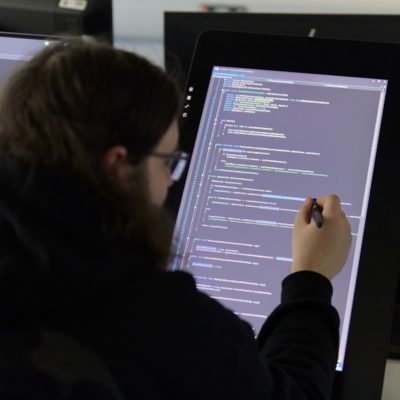
Computing (Software Engineering) MSc
Our master's in Computing (Software Engineering) course allows you to study the design of software systems...
To ensure we guide you through the correct application process, we just need you to answer a few quick questions.
Already applied?
Log in to view updates.
This course offers two separate application routes, depending on whether the application is submitted by the student or an international agent.
Please select your desired length of study from the available options.
This course includes a placement option. Please indicate whether you’d like to apply with or without a placement.
Please select where you would like to study.
All the available academic years are displayed below.
All the available start months for the selected academic year are listed below.
Please review the information below carefully before continuing.
If you need to make any changes, click the < Back button to return to the previous step.

Level
Master'sPG MSc
Duration
Full Time: 1 year
Part Time: 2 years
Starting
September, February
Full Time: £8,500
Part Time: £945 per 20 credit module
International: £17,495
Waterside
Updated 27/03/2025
Updated 27/03/2025
For questions regarding study and admissions please contact us:
study@northampton.ac.uk
0300 303 2772
With the University of Northampton’s Computing (Computer Networks Engineering) MSc course, you will have the opportunity to study computing in great depth. In addition to completing an individual thesis on an area of computer networks engineering that is of particular interest to you, this Computing (Computer Networks Engineering) course will also allow you to develop your research and analytical abilities. This will equip you with all the skills you need to enhance your career prospects further.
Embarking on a computer networks engineering course offers access to a realm of boundless possibilities in the digital age. In today’s interconnected world, this course is beneficial for those aspiring to build a career in the ever-evolving field of information technology. Within this programme, you will explore the fundamental principles of network architecture, data transmission, security, and management. You will be well-prepared to craft, execute, and sustain computer networks, ensuring uninterrupted connectivity and data flow. Whether your focus is in network administration, cybersecurity, or telecommunications, a computer networks engineering course equips you with the skills and expertise required to meet the dynamic and competitive job market’s demands.
Computer Networks Engineering MSc applicants will normally hold a recognised first or second class honours degree from a UK university or international equivalent in a relevant subject. We expect that you will have a working knowledge of computers and networks and it is essential that you have practical hands-on experience of at least one programming language.
For information on how to apply to study with us, please see our How to Apply page.
2025/26 Tuition Fees
Fees quoted relate to study in the Academic Year 25/26 only and may be subject to inflationary increases in future years.
Upon completion of this Computing MSc course, you will be equipped to pursue a range of careers. Well-trained staff are in high demand across the computing and IT industries, and our graduates will be able to embark on job roles such as:
Computing MSc students will benefit from access to around 150 PC and Linux workstation computers. Alongside digital projection facilities, these are all housed in six bespoke computer laboratories, which are maintained by two technicians.
To ensure you receive personalised care which allows you to enhance your knowledge and develop your skills, we only enrol small cohorts of students. We have developed this course to be studied around other commitments and you may only need to attend the university for two days per week.